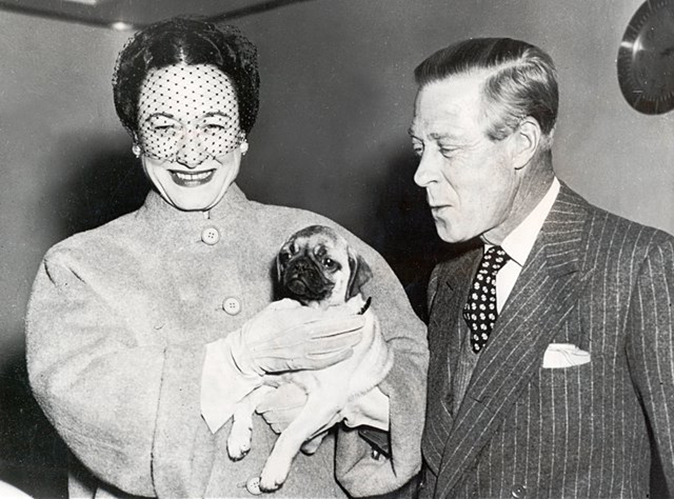Carla Carlisle on Wallis Simpson: 'I'd even go so far as to suggest Wallis saved the monarchy'
Is it possible that Wallis Simpson saved the monarchy? Carla thinks it could be so, although she has little time for Maddona’s latest portrayal


In the ‘Letter from London', she's described as a London hostess of such importance that her invitations have come to rank as commands. She's remarkable ‘because she likes sociability and dislikes social obligations, because she prefers the parlour to the night club, because she never asks personal questions, and because she has a real gastronome's gift for knowing about good food.' Outside of that, ‘she is not an extraordinary American'.
By now, you may have guessed that the un-extraordinary American is the woman whose principal achievement was far from ordinary. Mrs Wallis Simpson of Baltimore, as she was on November 4, 1936, when the article appeared in The New Yorker, changed the course of British history. Writing under the nom de plume of ‘Genêt', Janet Flanner describes her compatriot in meticulous detail. ‘Her best feature is her high, well-poised forehead... her head an ample cranial structure that dominates her frail body.' Her figure is ‘flawless and impersonal in the modern manner'.
It's difficult not to like the woman Miss Flanner describes. She dresses simply and with habitual neatness and ‘speaks with a Baltimore accent that she's never tried to Anglicise'. She's no social snob, although she ‘has the American woman's tendency to reform men in small ways; she's mentally snobbish, like many American women, in that she sensibly prefers people who will instruct her, or any how furnish brilliant conversation'. She mixes her own cocktails ‘as accurately as any barman', although she prefers whisky and soda. She's a good cook herself, but ‘she can make her own cook a good cook'. She ‘gets more out of her English servants than most Englishwomen do out of theirs'.
Despite the revelations, Miss Flanner's profile is a masterpiece of discretion. Nowhere is there mention of the King, nor of the house in Regent's Park recently rented by Mrs Simpson and paid for by him. Miss Flanner's readers were Americans who knew the story of Mrs Simpson and the King. Only the British people were kept in ignorance, thanks to the silence of the British press.
My fascination with the woman from Baltimore goes way back. I remember photographs of the wistful, boyish man and his severe-looking wife in Life. Soon after I came to England, I read Frances Donaldson's Edward VIII and a dozen other books which claimed that she'd had Nazi lovers, was actually a man, mastered bizarre sexual techniques in China. I've saved only the two-volume catalogue of the Sotheby's sale simply called The Duke & Duchess of Windsor.
The sale of 3,000 lots-possessions they collected during their long, acquisitive, ultra-rich, trivial lives-is the ‘hook' for the newly released film by Madonna, W.E. (their pet name for themselves — ‘W'allis and ‘E'dward). It's the latest attempt to put ‘the greatest love story ever told' on screen. Although the clothes are great, it's also the worst movie ever made.
Perhaps it isn't possible to portray them in a favourable light-in the remake of Upstairs Downstairs and in The King's Speech, Wallis and David are painful caricatures-but Madonna's film has one important merit. Appearing on the eve of the Diamond Jubilee of The Queen, it reminds us how much this country owes to Wallis Warfield Simpson, Duchess of Windsor. Thanks to the twice-divorced woman from Baltimore, the throne was occupied by George VI and then his daughter, Elizabeth II.
Exquisite houses, the beauty of Nature, and how to get the most from your life, straight to your inbox.
I'd even go so far as to suggest Wallis saved the monarchy. The Queen and her father before her have provided the steadiness and greater intellectual capacity the country needed. This year, as we raise our glasses and toast ‘God Save The Queen', I'll quietly add ‘And Thank God for Wallis'.
This article first appeared in Country Life in 2012
Country Life is unlike any other magazine: the only glossy weekly on the newsstand and the only magazine that has been guest-edited by His Majesty The King not once, but twice. It is a celebration of modern rural life and all its diverse joys and pleasures — that was first published in Queen Victoria's Diamond Jubilee year. Our eclectic mixture of witty and informative content — from the most up-to-date property news and commentary and a coveted glimpse inside some of the UK's best houses and gardens, to gardening, the arts and interior design, written by experts in their field — still cannot be found in print or online, anywhere else.
